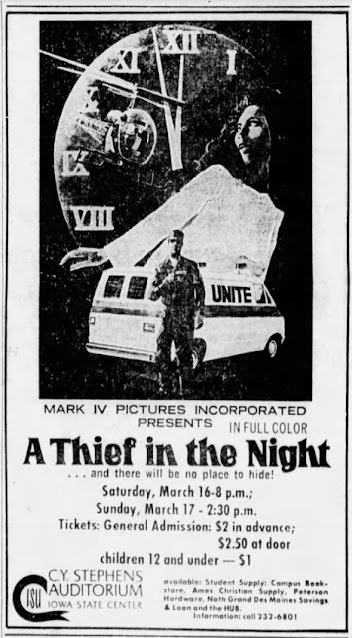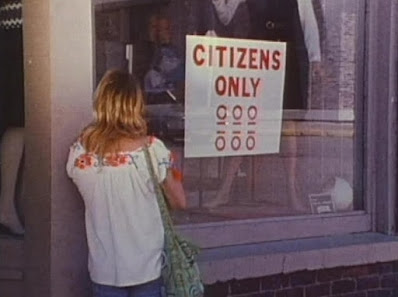Poor Patty Myers. She was a good person, a decent Christian, and lived by the Golden Rule. Unfortunately for her, in God's eyes, that just wasn't enough.
One morning, her husband and millions of others, being completely twitter-pated with the Haysoos, disappear without a trace, leaving Patty and the other unworthy to deal with the Antichrist.
Here, in the form of a New World Order organization going by the handle of UNITE (United Nations Imperium for Total Emergency), the acolytes of the Antichrist demand all of those left behind must denounce their shattered faith and swear eternal allegiance to them by accepting a stamp -- or mark, if you're more biblically inclined -- consisting of a series of ones and zeroes: the binary code for 666, the Mark of the Beast…
Well, apparently, according to some, the world will finally come to an end this coming weekend with the Rapture due sometime on Saturday. Now, I'm not here to argue on whether or not this is really going to happen or get into any kind of theological debate on which side of the fence I fall in the whole Divine scheme of things. (Editor’s Note: this was allegedly supposed to happen in 2011 and, as of 2024, we’re still here.)
Nah. It's just all this talk about the allegedly nigh Biblical Apocalypse has got me to reminiscing about a trippy scare film concerning the Rapture and the Tribulation, which I was exposed to by a rickety projector and some shitty synch-sound in a church basement many, many moons ago called A Thief in the Night (1972).
The Des Moines Register (March 13, 1974).
Now, A Thief in the Night was only the first part of Mark IV Productions Rapture / Prophecy tetralogy. Based out of, and filmed around, Des Moines, Iowa, this religious themed production house was the brainchild of Russell S. Doughten, who had been a jack-of-all-trades for Good News Productions; another religious based filmmaking outfit operating in Pennsylvania in the 1950s.
If that's ringing some bells for any of you, yes, that was the same outfit who cranked out The Blob (1958) for Jack H. Harris. In fact, it was Harris's shabby treatment in the post-production phase that caused a frustrated Doughten to eventually pull up his revival tent stakes and head further west, where he eventually settled in Des Moines. Doughten felt he deserved a full producer's credit on The Blob. He didn't get it. Wait. Vanity is a sin, right?
“I started a group called Heartland Productions -- put together in 1964 -- and we made our first film, The Hostage (1965),” said Doughten in an interview with Tom Weaver (Science Fiction Confidential, 2002). In the film, a bratty kid hitches a ride on a truck driven by a couple of hoodlums (Don Kelly, Harry Dean Stanton), who hold him for ransom.
“It was based on a book by Henry Farrell, the writer of the novel Whatever Happened to Baby Jane and Hush … Hush Sweet Charlotte,” said Doughten. “It was released by Crown International. We actually released it in Iowa ourselves and had a pretty nice release here, but when we turned it over to Crown, it didn't go too far.”
The last secular film Doughten produced was Fever Heat (1968), which concerned dirt track racing, and which would also be one of the last vehicles for Nick Adams -- Hell is For Heroes (1962), Frankenstein Conquers the World (1965), who would sadly pass away under dubious circumstances while the film was in post-production.
After that, Doughten started working with Mark IV Pictures, who would exclusively make feature-length films based on the Word of the Gospel.
Said Dougthen, “They’re basically about eschatology (the part of theology concerned with death, judgment, and the final destiny of the soul) and the Tribulation (a seven-year period when God puts the finishing touches on the final judgment of the unbelieving). We began with a film called A Thief in the Night, which is still our best known film.”
The plot concerned “an event called the Rapture of the Church -- a trumpet sounds and Christ returns, and He is met in the air by the dead saints rising and by the live saints meeting Him,” according to Doughten. “They are then all taken up into Heaven. The rest of the world is left in a shocked state. The film starts with those events, and then the drama concerns those who have been left behind, those who didn’t meet Christ.
“The main character is a young lady who has just been married, but who is not a believer. Her husband was a believer so he’s gone, and she finds herself left alone and the story follows her adventures in this new era. It’s all based on the Scriptures -- the elemental things happening around them are Scriptural events.”
Doughten would also appear in the film as Reverend Matthew Turner. Said Doughten, “He’s this pastor in a big church. We see him preaching, and he’s preaching, in essence, against the Scripture -- he teaches a totally spurious Gospel. As a result, when the Rapture happens, he doesn’t go. Nor does the heroine of the story, one of his parishioners.”
Shot locally, with local actors, Doughten found a real diamond in the rough with Patty Dunning, who would play the heroine who gets left behind; thanks to her efforts, you become invested in her journey beyond (or in spite of) what Doughten was so zealously preaching.
But there are still plenty of acting gaffes and some plot specific and dated laughs to be had (-- nice porn 'stache there, dude) at the film’s expense; and it does kinda go off the rails a bit in a good / bad kind of way once Patty goes on the run; but overall A Thief in the Night is an earnest and somber affair that lacks the true fundie whackadoodleness and fanatical delirium of your Estus Pirkle or Ron Ormand convert-or-die screeds like If Footmen Tire You, What Will Horses Do? (1971) or A Burning Hell (1974).
The Elizabethon Star (February 9, 1972).
For the record, things do get a little more shrill and wonky in the three sequels: A Distant Thunder (1978), Image of the Beast (1980) and The Prodigal Planet (1983) -- definitely more head-chopping. But while watching their inaugural effort, one cannot deny that there's some real talent behind the camera and in the editing booth that belie it's small town origins. (Check out the constantly moving camera and those stellar montage sequences.)
And I really kinda dug how they pulled off that twisty shock ending, when the film basically laps itself, and poor Patty's waking nightmare turns out to be only the beginning -- the beginning of the end.
DAMMIT!!!
Originally posted on May 20, 2011, at Micro-Brewed Reviews.
A Thief in the Night (1972) Mark IV Productions / D: Donald W. Thompson / W: Donald W. Thompson, Russell S. Doughten, Jim Grant / C: John P. Leiendecker Jr. / E: Wes Phillippi / P: Russell S. Doughten, Donald W. Thompson / S: Patty Dunning, Mike Niday, Colleen Niday, Maryann Rachford, Thom Rachford


















No comments:
Post a Comment